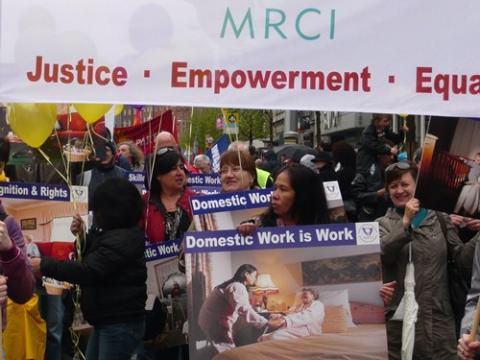Rights, Dignity and Recognition - Domestic Work is Work!

On the 100th Anniversary of International Women’s Day organised domestic workers across the world launched an international campaign to get legally binding international legislation to protect domestic workers’ rights. Aoife Smith of the Domestic Workers’ Action Group gives an overview of the campaign to protect some of the world’s most invisible workers.
Domestic worker organisations and trade unions have been battling to get domestic work onto the International Labour Organisation (ILO) agenda for the last 50 years. In 2008, the battle finally paid off and at present the negotiation process is well underway. But many challenges lie ahead in the coming months before domestic workers can claim victory and have their employment rights recognised and protected by legally binding international standards.
Despite providing essential roles in society by enabling others to work outside the family home, the valuable work of childminders, cleaners and carers of the elderly is undervalued and underpaid. Getting domestic work recognised as work is one of the major struggles of domestic workers’ movements, globally. In some countries, domestic workers are completely excluded from the protection of labour laws leaving workers open to exploitation.
Millions of women and girls around the world are domestic workers. They are recognised as some of the most abused and exploited workers. Isolated behind closed doors, many ‘invisible workers’ suffer abuse at the hands of their employers. Wage exploitation, long working hours, forced labour, sexual, physical and psychological abuse and harassment are all common. The domestic work sector needs specific legislation to protect this historically neglected group.
In Ireland, a survey conducted by the Domestic Workers’ Action Group (DWAG) in 2010 found that:
- 40% of domestic workers surveyed do not have an employment contract
- 38% are paid under the minimum wage (with severe cases as low as €2 per hour)
- 42% do not receive payslips
- Two thirds of those surveyed experienced exploitations as a domestic worker in Ireland
- 30% work Sundays and Bank holidays without extra pay or a day off.
- 44% raised a complaint with their employer about their unfair treatment and long working hours but their concern was ignored and nothing changed.
Supported by the Migrant Rights Centre Ireland, DWAG has been campaigning for the rights and dignity of domestic workers in Ireland since 2004. DWAG is mobilising support for a strong rights-based ILO Convention. DWAG, together with domestic worker organisations internationally, is campaigning to ensure that domestic workers’ voices are being fairly represented in the process to ensure the final instrument protects the rights of all domestic workers, regardless of their immigration status or whether they are employed by a diplomat - two contentious issues in current discussions. The reality is migrant women make up a significant proportion of domestic workers globally. Any discussions will have to consider their situations. DWAG believes that a person’s immigration status should never be allowed to be used to deny a worker their rights – this is a morally indefensible argument.
The campaigning will come to a head in Geneva in June 2011, when the standard will be discussed and finalised, hopefully taking the form of an international Convention supplemented by a set of Recommendations. Our task now is to negotiate and convince the Irish government to commit to supporting a Convention that is both effective and ratifiable.
This campaign for the rights and recognition of domestic workers needs to be made visible. In the build up to June we need to strengthen alliances, as lobbying the government into responding positively is a priority. The collaboration between trade unions and NGOs with regard to domestic workers is a model of how, with common vision, workers’ organisations can be strengthened and contribute towards building a dynamic labour movement. We invite the trade union movement and civil society organisations to join us in a global campaign for decent work and rights for domestic workers by organising and supporting our actions to put pressure on the government to vote in favour of a meaningful rights-based ILO Convention. March 8th was a ‘Global Call to Action’ for this campaign. Worldwide, trade unions and domestic workers’ organisation used this moment to raise awareness for rights and dignity for domestic workers in calling for a Convention.
To support this campaign please sign DWAG’s petition – we are collecting as many signatures as is possible. The petition will be delivered to the government before they travel to Geneva to vote in June. Also, you can write a letter to the Minister for Labour Affairs asking them to support this Convention. Please see www.mrci.ie for a sample letter, petition and more information on this campaign and how you can support it.
For more info on this campaign visit www.domesticworkerrights.org / www.mrci.ie/Domestic-Workers or email aoife@mrci.ie
